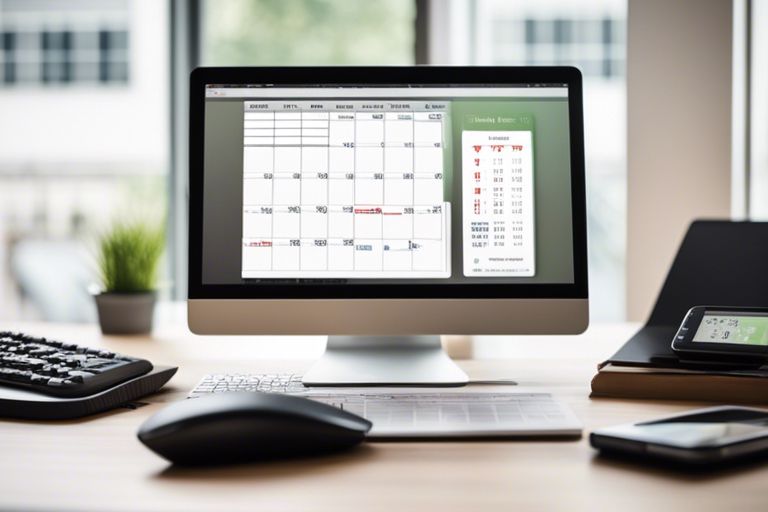7 time management tips for busy professionals
Time management is crucial for busy professionals looking to juggle multiple tasks and responsibilities effectively. In today’s fast-paced world, it can be challenging to stay on top of deadlines, meetings, and projects. To help you maximize your productivity and minimize stress, here are 7 essential time management tips to incorporate into your daily routine.
Prioritizing Tasks
For busy professionals, managing time effectively is crucial in order to meet deadlines and achieve goals. Prioritizing tasks is a key aspect of time management that can help individuals focus on what matters most and increase productivity. By prioritizing tasks, professionals can ensure that they are using their time and energy efficiently on the most important activities.
The Eisenhower Matrix
Any busy professional can benefit from using the Eisenhower Matrix to prioritize tasks. This method, popularized by former US President Dwight D. Eisenhower, categorizes tasks into four quadrants based on their urgency and importance. Tasks are divided into categories such as urgent and important, important but not urgent, urgent but not important, and neither urgent nor important. By using this matrix, professionals can clearly identify which tasks require immediate attention and which can be delegated or postponed.
Any prioritizing tasks using the Eisenhower Matrix allows professionals to focus on activities that align with their long-term goals and values. By distinguishing between urgent and important tasks, individuals can make more informed decisions about where to allocate their time and energy. This method helps professionals avoid getting bogged down in tasks that may seem urgent but do not actually contribute to their overall objectives.
The Pareto Principle (80/20 Rule)
Any busy professional can also apply the Pareto Principle, commonly known as the 80/20 rule, to prioritize tasks effectively. This principle suggests that roughly 80% of results come from 20% of efforts. By identifying the tasks that yield the most significant results, professionals can focus on activities that have the greatest impact on their success. The key is to identify the 20% of tasks that contribute most to overall productivity and prioritize them accordingly.
A common application of the Pareto Principle in time management is to focus on the tasks that contribute the most value and delegate or eliminate those that have minimal impact. By concentrating on the critical few tasks that drive success, professionals can optimize their time and resources for maximum efficiency. This approach can lead to a significant increase in productivity and overall effectiveness.
Strategic Scheduling
If you’re a busy professional looking to maximize your productivity, strategic scheduling is key. By effectively managing your time, you can ensure that you are making the most of each day and accomplishing your goals efficiently. Here are some tips to help you master strategic scheduling and take control of your time.
Time Blocking Techniques
The concept of time blocking involves setting aside specific blocks of time for different tasks or activities. By dedicating uninterrupted time to focus on a single task, you can boost your productivity and concentration. To leverage time blocking effectively, identify your most important tasks and allocate dedicated time slots for them in your schedule. This technique can help you stay organized, prioritize your responsibilities, and make significant progress on your goals.
Avoiding the Pitfalls of Multitasking
Time is a finite resource, and multitasking can actually hinder your productivity rather than enhance it. Attempting to juggle multiple tasks at once can lead to decreased focus, quality of work, and efficiency. To avoid the pitfalls of multitasking, focus on one task at a time and commit your full attention to it. This approach can help you complete tasks more effectively and efficiently, leading to better outcomes in the long run.
Scheduling your day with a focus on one task at a time can lead to improved time management and productivity. By concentrating on one task and seeing it through to completion, you can enhance the quality of your work and reduce the risk of errors. Remember, quality is often more important than quantity when it comes to managing your time effectively.

Setting Realistic Goals
Managing time effectively starts with setting realistic goals. Setting achievable targets helps professionals stay focused and motivated as they work towards their objectives. By setting specific and measurable goals, individuals can track their progress and adjust their strategies accordingly.
SMART Goal Framework
After determining what needs to be accomplished, professionals can apply the SMART goal framework to their objectives. This framework encourages setting goals that are Specific, Measurable, Achievable, Relevant, and Time-bound. By incorporating these criteria into their goal-setting process, individuals increase their chances of success.
On top of that, breaking down larger goals into smaller, manageable tasks can help professionals make steady progress towards their ultimate targets. This approach not only boosts productivity but also enhances clarity and focus as individuals work on different aspects of their goals.
The Role of Deadlines in Effective Time Management
Setting deadlines plays a crucial role in effective time management. Deadlines create a sense of urgency and accountability that can drive individuals to prioritize tasks and work efficiently towards their goals. By setting realistic deadlines, professionals can avoid procrastination and stay on track with their timelines.
Setting realistic deadlines involves estimating the time required to complete tasks accurately. By breaking down projects into smaller segments and assigning specific deadlines to each, professionals can manage their time more effectively and avoid last-minute rushes that can lead to stress and lower-quality work.
Managing Interruptions and Distractions
Now, interruptions and distractions are inevitable in the fast-paced world of busy professionals. To effectively manage these disruptions and stay on track with your tasks, follow these 7 Time Management Tips to Transform Your Day.
Identifying Time Wasters
The first step in managing interruptions and distractions is identifying time wasters. Ask yourself what activities or habits are consuming your time without adding value to your work. Common time wasters include excessive social media browsing, long meetings that could have been emails, and multitasking that leads to decreased productivity.
To combat time wasters, prioritize tasks based on their importance and urgency. Set specific time limits for activities that tend to eat up your day, such as checking emails or scrolling through social media. By eliminating or limiting these time wasters, you can reclaim valuable hours in your day for more meaningful and productive work.
Techniques for Staying Focused
Identifying strategies to enhance your focus is essential in minimizing interruptions and distractions. Techniques for staying focused include creating a dedicated workspace free from distractions, using time-blocking to allocate specific time slots for tasks, and implementing the Pomodoro Technique where you work in focused intervals followed by short breaks.
Focused attention on your tasks not only improves the quality of your work but also increases productivity by reducing the time spent on unnecessary interruptions. By incorporating these techniques for staying focused into your daily routine, you can accomplish more in less time and achieve your professional goals with greater efficiency.
Leveraging Technology
Unlike traditional time management methods, leveraging technology can significantly enhance productivity and efficiency for busy professionals. By incorporating the right tools and apps into your daily routine, you can streamline tasks, prioritize effectively, and stay organized in the fast-paced world of work.
Time Management Tools and Apps
With a plethora of time management tools and apps available in the market, professionals can choose the ones that best suit their needs and preferences. Whether it’s project management software like Trello or communication tools like Slack, these applications can help you track deadlines, collaborate with team members, and monitor progress on tasks in real time. By utilizing these tools, you can optimize your workflow and focus on high-priority activities, leading to increased productivity.
Additionally, time tracking apps such as RescueTime and Toggl can provide valuable insights into your daily habits and time usage. By analyzing where your time is being spent, you can identify areas for improvement and make necessary adjustments to boost efficiency. These tools not only help you manage your time effectively but also empower you to make informed decisions about your work habits.
Automating Repetitive Tasks
On top of time management tools, leveraging technology to automate repetitive tasks can be a game changer for busy professionals. By using tools like Zapier or IFTTT, you can create automated workflows that handle routine tasks such as email reminders, data entry, and social media posts. This automation not only saves precious time but also minimizes the risk of human error, ensuring consistent and accurate results.
To further enhance automation, professionals can explore the capabilities of artificial intelligence (AI) assistants like Siri, Alexa, or Google Assistant. These AI-powered tools can schedule meetings, set reminders, and provide information instantly, acting as virtual assistants to help manage your tasks efficiently. By embracing automation technology, you can delegate mundane tasks and free up time for more strategic work that adds value to your role.

Self-Care and Time Management
Despite the hectic schedules and endless to-do lists that busy professionals face, it is crucial to prioritize self-care in order to maintain productivity and overall well-being. Time management is not just about scheduling tasks efficiently; it also involves taking care of your physical and mental health. By incorporating self-care practices into your daily routine, you can improve your focus, energy levels, and productivity.
If you’re looking for more time management tips, check out 20 Time Management Tips for Professionals to enhance your productivity further.
The Impact of Health on Productivity
Health is a crucial factor that significantly impacts your productivity. When you neglect your well-being, you are more prone to burnout, fatigue, and lack of focus. By prioritizing your health through regular exercise, balanced nutrition, and sufficient sleep, you can enhance your cognitive abilities, creativity, and overall performance at work.
Additionally, incorporating mindfulness practices such as meditation or yoga can help reduce stress levels and improve your ability to concentrate, leading to enhanced productivity throughout the day.
The Value of Breaks and Downtime
Any successful time management strategy includes the recognition of the value of breaks and downtime. Taking short breaks throughout the day can help you recharge and refocus, ultimately boosting your productivity. Engaging in activities you enjoy during your downtime can also contribute to reducing stress levels and increasing overall job satisfaction.
Breaks are not a sign of laziness but rather a strategic way to optimize your performance. Research shows that incorporating short breaks in between tasks can lead to improved concentration and efficiency, making you more effective in completing your work tasks.
Review and Adjust Your Time Management Practices
To thrive in a fast-paced professional environment, it is crucial to continually review and adjust your time management practices. By regularly analyzing how you allocate your time and identifying areas for improvement, you can enhance your productivity and efficiency.
Periodic Review of Time Management Techniques
To stay on top of your game, set aside time on a regular basis to assess the effectiveness of your time management techniques. Reflect on what strategies have been working well for you and which ones may need tweaking. Consider keeping a time log for a week to track how you spend your time and identify any patterns or time-wasting activities that can be minimized.
Periodic reviews allow you to stay proactive in optimizing your time management skills. By continuously fine-tuning your approach, you can ensure that you are making the most of your time and energy to achieve your professional goals.
Adapting to Changing Professional Demands
To effectively manage your time as a busy professional, it is essential to be flexible and adaptable to changing demands. As your workload or responsibilities evolve, be prepared to adjust your priorities and time management techniques accordingly. Embrace new tools and technologies that can streamline your workflow and help you stay organized.
Time management is not a one-size-fits-all solution; it requires constant evaluation and adaptation to align with your current professional challenges. By embracing change and being open to trying new approaches, you can stay ahead of the curve and remain productive in your field.
Management of your time is a dynamic process that requires continuous monitoring and adjustment. Stay agile and proactive in responding to the evolving demands of your professional life to maximize your efficiency and achieve success.
Conclusion
Taking this into account, implementing effective time management strategies is crucial for busy professionals to maximize productivity and achieve work-life balance. By incorporating the tips outlined in this article, such as prioritizing tasks, setting boundaries, and utilizing technology tools, professionals can better manage their time and reduce stress in their daily lives.
Remember that time management is a skill that can be developed and improved over time with practice and consistency. By staying organized, focusing on important tasks, and managing distractions, busy professionals can take control of their schedules and ultimately accomplish more in less time.
